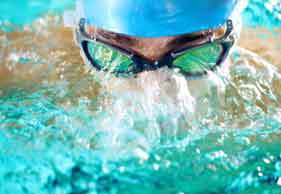Swimming to cool down after a hard run in summer is
always a treat, but swimming offers so much more. For starters, it is
particularly useful for recovery, as the water has a cooling effect on muscles,
which enhances recovery. Still better, swimming is non-weight-bearing, so when
used as part of your fitness routine, it promotes recovery of muscles, joints
and bones. There is an increase in activity of the circulatory system due to
increased bloodflow through muscle activity, and swimming also activates the
core muscles, which can lead to faster and longer running form. Furthermore, something
that runners might not know about is the beneficial effect swimming has on the
brain: Learning and practising new motor-neuron skills has a significant
positive impact on the aging process on our brain and body functions.
The caveat to all these benefits, however, is that
with poor swimming technique, other problems can arise, so it’s not just a case
of jumping in. For example, back pain and an unconditioned shoulder can result
from hyperextension of the spine from a poor body position in the water. Poor
technique can also result in swimming too hard and taxing yourself in what is
meant to be a recovery session.
SWIM MINDFULLY
Even runners who swam at school and think they are fairly
competent should be careful: That was a long time ago, and the type of swimming
you did then was fast and not mindful at all. Runners are also challenged to
adapt mentally to swimming in a pool, because with just a black line to look at
and little opportunity to chat to mates in your usual running group, boredom
could set in, so it’s important for you to up your focus.
Before starting, it’s best to get some advice on
technique, to avoid injury and stay motivated. Find a coach who is focused on
technique, because just joining a swim squad is not the answer, as these can
turn into mini races – especially for the competitive runner. Frustration could
also set in as you discover that you are not as good at swimming as you are at
running. Squad swimming can result in poor swimmers, but swimming more
mindfully will decrease chances of injury and take away the boredom factor. You
will have too much to think about as you practise executing a good stroke, and
swimming will become a form of meditation and rest from running (and life).
FIND YOUR PACE
Since you are not looking for a major gain in your
fitness, it is best to practise swimming in the very lowest range of perceived
effort. This might be a challenge, though, if you have poor technique,
especially relating to breathing. Seek advice, don’t just try and plough
through! Avoid training sessions that you find on the internet, as these don’t
speak to technique and will often recommend training aids which may not benefit
you. For example, kicking with a kick-board may seem like a good idea, as it
will certainly give you a workout, but you are also putting your back into a
hyper-extended position, which might cause you pain. The same goes for hand paddles
– they add resistance and build muscle, but put strain on unconditioned shoulders
and could lead to injury.
You might say that since you only want to swim for
recovery, it doesn’t matter how you swim. Well, it does matter. First avoid
injury and in time you may discover another joy, aside from running. And it
could turn out to be a bonus if you find yourself laid off from a running
injury. You never know, you might become addicted to swimming and find yourself
lining up for a triathlon or swimming race in the future!
ABOUT THE AUTHOR
Georgie Thomas is the Head Coach of Total
Immersion Swimming South Africa. Go to www.totalimmersionsa.co.za to find out about
workshops all around SA, or mail georgie@totalimmersionsa.co.za.


